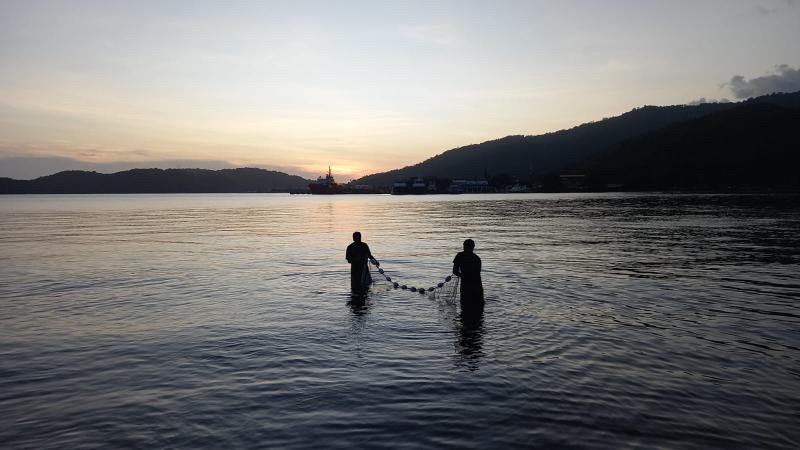The heaviest reptile in the world and the only sea turtle that lacks scales and a hard shell, the leatherback turtle has remained relatively unchanged for more than 100 million years. But today, the species faces many dangers. Targeted by hunters and affected by pollution, their eggs are often trampled by ignorant beachgoers. With some populations in Pacific and Southwest Atlantic classified as critically endangered, better measures are needed to bring the leatherback turtle back from the brink.
A climate and ocean scientist with a passion for public policy, Joshua Prentice’s goal is to protect the leatherbacks that nest on the coast of Trinidad and Tobago. He wants to build resilience into species – humans included – in the face of climate change.
As an education officer at the national Environmental Management Authority, he is in the right place to make a difference. The organisation Links local schools, businesses and educational institutions with government to meet the island nation’s economic and sustainability goals.
You can’t just come in and, with a word, fix everything.
“You can’t really save the turtles unless you talk to fishermen and local communities, provide education, create laws and policies to help create a protective framework,” says Prentice. “You need projects to be assessed by stakeholders. You can’t just come in and, with a word, fix everything. That’s what I learned early on: it can’t just be me alone. We need everyone to buy into these ideas.”
Nature under pressure
Prentice’s hometown of Couva, on Trinidad’s west coast, overlooks the Gulf of Paria and its rich marine biodiversity, fisheries and oil and gas reserves. As a child, the beach was his playground: Prentice enjoyed family walks and fishing and hunting with his father, and he developed a deep respect for the environment. But in his teens, he saw trouble in paradise.
“Because of the coastline’s industrialised nature, I saw the degradation of certain areas, from bauxite mining [a technique used in aluminium production] and sedimentation from industry,” he says.
As Prentice pursued his passion for conservation science and activism, he came to understand the power of public policy to create sustainability.

“I want my children to have the same experiences I had – or even better! I want them to catch fish and to have a sense of pride in where they came from. But over time, I knew that I would need certain tools and gain skills to achieve that,” he reflects.
“I knew I’d have to lobby government, get people engaged and make stakeholders voice their opinions. I’d need to start a movement or be in a place where I have the ability to get people to speak to government to move forward.”
A starting point was building knowledge and practical research skills. Prentice did an undergraduate degree in biology at the University of West Indies in Jamaica focused on marine biology, ecology and environmental biology. His research for a master’s degree in science at the University of Trinidad and Tobago investigated plastics pollution and marine debris in local rivers and protected wetlands.
The power of good policy
As with other small island nations, the impact of climate change on Trinidad and Tobago will be disproportionate. With a population of just 1.5 million, and dependent on income from oil and gas, agriculture, commercial fishing and tourism, the nation’s pathway to sustainable resource management must come from government, industry and community collaborations, as well as new technologies, says Prentice.
More modern practices, as well as a diversified and de-carbonised economy, will be key. Trinidad and Tobago’s decarbonisation plans include the use and promotion of renewable energy sources and the modernisation of the country’s public transport systems.
Educating the country’s fisherman on sustainable fishing practices is also key.
“The fisherman grew up seeing the environment as a pay day, but now they’re saying, ‘Nobody’s buying fish because they’re too expensive and the fish I catch now are too small.’ That’s a by-product of their choices and the fishing pressure they’ve helped bring about,” says Prentice. “The public needs to buy into concepts like mandatory training and licences for fishermen, so they can see how to help themselves by considering the environment.”
Joining local and international youth-activist communities and NGOs has boosted Prentice’s skills in conflict-resolution and negotiation. It’s also connected him to a global network of like minds with shared experience and commitment. Meeting young Kenyan farmers battling drought and scientists such as Shannon Lisa, who is working to reduce chemical waste in vulnerable communities in the United States, fuel his enthusiasm. He’s confident that Trinidad and Tobago is moving towards a sustainable and climate change-resilient future.
I am focused on the ways we can adapt to climate change and create real resilience from it.
“Even if Trinidad and Tobago were to cut emissions now and no longer produce oil and gas, as a country, we’re still not going to affect the big picture,” says Prentice. There’s so much more than the island needs to do to shore up its future, he says, and he wants to get ahead of it before it’s too late. “I am focused on the ways we can adapt to climate change and create real resilience from it.”
Story by Michelle Fincke


Comments are closed.